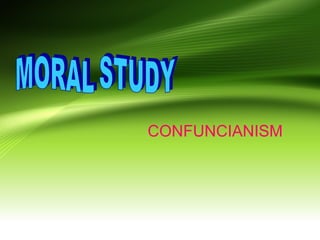
Moral study ( Confucianisme )
- 2. Is Confucianism a religion? -Confucianism is definitively non-theistic -Confucianism is humanistic -On spirituality, Confucius said to Chi Lu, one of his students, that "You are not yet able to serve men, how can you serve spirits?"
- 3. INTRODUCTION Formed c. 500 B.C.E. Origin China Followers 63,000,000 Deity None / various gods and ancestors Sacred Texts Analects,The Five Classics,Four Books Headquarters None
- 4. •-6,300,000 followers around the world • MAIN GEOGRAPHICAL REGIONS PRACTICED • China, Korea, Vietnam & the Chinese & Vietnamese diaporas.
- 5. FOUNDER • developed from the teachings of the Chinese philosopher Confucius. • originated as an "ethical-sociopolitical teaching" during the Spring and Autumn Period. • later developed metaphysical and cosmological elements in the Han Dynasty.
- 6. HISTORICAL ORIGINS K'ung Fu Tzu ( Confucius ) Born in 551 B.C.E state of Lu ( Shantung Province ) opened school in age 22 & travelled throughout China for 13 years. Died in 470 B.C.E at age 72 & his lifetimE almost coincided exactly with the life of Buddha. During the 4th 3rd centuries B.C.E. a diverse collection of his writings circulated concerning his life and teachings. 2nd & 1st centuries B.C.E, a cohesive system of Confucian beliefs were formed
- 7. MISSIONS & EXPANSIONS SONG DYNASTY Zhu Zi ( 1130-1200 C.E ) Neo-Confucianism Develope an interpretation that unified human nature with cosmic principles such as the dynamic, complementary interplay of Ying & Yang, the holding of cosmic pattern( Li )inhumanheart-minde, & cycle of transformation described in texts such as the Yijing. MING DYNASTY Wang Yangming ( 1472-1529 C.E ) true knowing Zhu's lixue ( Learning of the cosmic Principles ) Wang's xinxue ( Learning of the heart-minded ) Daoxue ( Learning of the way ) LE DYNASTY ( VIETNAM ) 1428-1788 C.E Sponsored the pubication of atext known as the Fort-Seven Rules for Teaching & changing, promoted social harmony through the rectification of family relationships among Confucian lines
- 8. KOREA Yi Hwang ( 1501-1570 C.E ) also known Yi Toegye & Yi I ( 1536-1584 C.E ) also known as Yi Yulgok Promote Confucianism as a resource for everyday life as well as for national defense JAPANESE Fujiwara Seika ( 1561-1619 C.E ) & Toju Nakae ( 1608-1648 C.E ) applied Wang's style of Confucianism to the challanges of educating youth, cultivating women's morality & other domestic concern
- 9. BELIEFS LI : includes ritual, propriety, etique Hsiao : love within family Yi : righteousness Xin : honesty & trustworthiness Jen : benevolence, humanesess towards other Chung : loyalty to the state Sacred narratives & texts - Classics of Change - Classi of Poetry - Classic of Rites - Classic of History - Classic & Autumn Annals Ultimate Reality & Divine Beings Human morals should therefore be based on human relationships Human Nature & the Purpose of Existence to reach one's highest potential as human being
- 10. WORSHIP & DEVOTION IN DAILY LIFE Ancient divination manual known as the Yijing (Classic of Change) original Confucian canon of Wujing (Five Classic) erly the Han Dynsty Become the basis of personal ritual practice for Confucians in the Song Dynasty when Zhu Xi (1130-1200) wrote his commentary on use of the text, Yi xue qimeng (An Introduction to the Study of the Yijing) The Yijing contains sixty-four gua :- general statement, commentary on the judgement, individual satements on specific lines within the hexagram, & apply that hexagram's various texts to the resolution of the question. To understand how the universe at large operated, one would come to understand oneself, & enter into deeper communion not only with Tiandao ( the Way of Heaven ) By using Yijing as a meditative aid, a Confucian could refine their qi ( vital energy ) to point of shenming.
- 11. THE TEACHINGS OF CONFUCIUS Social Teachings of Confucius The key to achieving proper self-mastery was adherence to correct ritual Political Teachings Focused onthe art of governance & how a ruler should act Teachings on Education Merit State examination Study without reflection is a waste of time, reflection without study is dangerous. - Confucius -
- 12. CHOOSE A JOB YOU LIKE, AND YOU WILL NEVER WORK A DAY IN YOUR LIFE. - CONFUCIUS -
